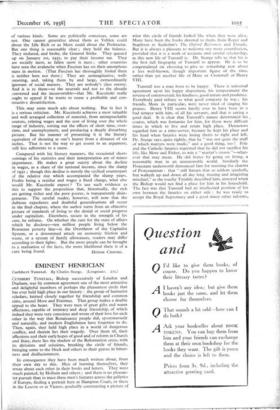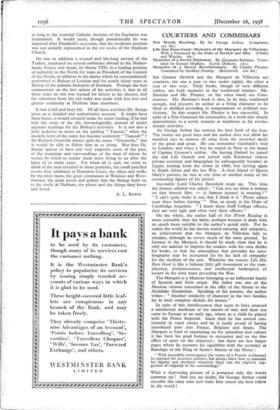EMINENT HENRICIAN
Cuthbert Tunstal. By Charles Sturge. (Longmam. 2 Is.) CUTHBERT TUNSTALL, Bishop successively of London and Durham, was by common agreement one of the most attractive and delightful members of perhaps the pleasantest circle that has ever held high place in our history : the group of humanist scholars, knitted closely together by friendship and common aims, around More and Erasmus. That group makes a double appeal to the heart. They were men of great gifts and warm affections, capable of intimacy and deep friendship, of which indeed they were very conscious and wrote of their love for each other in the way that Renaissance people did, spontaneously and naturally, and modern Englishmen have forgotten to do. Then, again, they held high place in a world of dangerous conflict, and therein lies their tragedy. Over them all, their affections and their early hopes of good and of reform in Church and State, there lies the shadow of the Reformation crisis, with its divisions and scissions, breaking the circle of friends, bringing some to the block and others to their graves in bitter- ness and disillusionment.
In consequence they have been much written about, from their own day to this. Men of learning themselves, they wrote about each other in their books and letters. They were much painted, by Holbein and others ; and there is no pleasan- ter pursuit than to trace these men's features across the galleries of Europe, finding a portrait here at Hampton Court, or there in the Louvre or at Vienna, gradually constructing a picture of
what this circle of friends looked like when they were alive. Many have been the books devoted to them, from Roper and Stapleton to Seebohm's The Oxford Reformers and Froude. But it is always a pleasure to welcome one more contribution, provided that it is a work of accurate and careful scholarship, as this new life of Tunstall is. Dr. Sturge tells us that his is the first full biography of Tunstall to appear. He is to be congratulated on choosing to give us something new about a less well-known, though important figure of the time, rather than yet another life of More or Cromwell or Henry VIII.
Tunstall was a man born to be happy. There is universal agreement upon his happy disposition, his temperament the reverse of controversial, his kindness, good nature and prudence. Everybody paid tribute to what good company he was ; his friends, More in particular, were never tired of singing his praises. Henry VIII seems hardly ever to have been in a bad temper with him, of all his servants, and that is saying a good deal. It is clear that Tunstall's nature determined his course, which was fortunate for him, for those were difficult times in which to live and retain high place. Detractors regarded him as a time-server, because he kept his place and his head when fanatics were losing theirs to right and left. Dr. Sturge says, quite rightly, that he "was not quite the stuff of which martyrs were made," and a good thing, too ! Pole and the Catholic fanatics regretted that he did not sacrifice his life, like More and Fisher, to win a "martyr's crown "—what- ever that may mean. He did better by going on living, a reasonable man in an unreasonable world. Similarly the Protestant underworld denounced him for resisting the charms of Protestantism : that " still Saturn that so seldom speaketh, but walketh up and down all day long musing and imagining mischief," as the touchy Tyndale described him, annoyed when the Bishop would not find a place for him in his household. The fact was that Tunstall had an intellectual position of his own between the fanatics on either side : he was ready to accept the Royal Supremacy and a good many other reforms,
so long as the essential Catholic doctrine of the Eucharist was maintained. It would seem, though paradoxically he was deprived after Elizabeth's accession, that his moderate position was not unfairly represented in the via media of the Anglican Church.
He was in addition a trusted and life-long servant of the Tudors, employed on several embassies abroad to the Nether-- lands, France and Spain, by Henry VIII, in a leading position of authority in the North for years as President of the Council of the North, in addition to the duties which he conscientiously performed as Bishop of London and for nearly thirty years as Bishop of the palatine bishopric of Durham. Perhaps the best commentary on the last sphere of his activities is that in all those years no one was burned for heresy in his diocese, and the transition from the old order was made with less loss and greater continuity at Durham than elsewhere.
It was a full and busy life. Of all these activities Dr. Sturge gives us a detailed and authoritative account. It might have been better, it would certainly make for easier reading, if he had told the story of the life chronologically, instead of under separate headings for the Bishop's activities. Is it not also a little pedantic to insist on the spelling " Tunstal," when the modern form of the name has become uniformly " Tunstall " ? Sir Richard Grenville always spelt his name " Greynvik," but it would be silly to follow him in so doing. Nor does Dr. Sturge appear to have any very exquisite sense of the past, of the trappings and surroundings of the men of whom he writes, by which to render them more living to us after the lapse of so many years. For when all is said, we come to think of the men revealed in those portraits, the small panelled rooms they inhabited at Hampton Court, the alleys and walks by the river there, the great ceremonies at Windsor and West- minster, the great porch and gallery that the Bishop built on to his castle at Durham, the places and the things they knew and loved.
A. L. ROWSE.















































 Previous page
Previous page